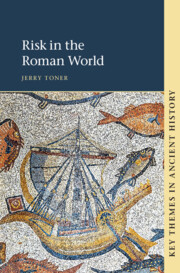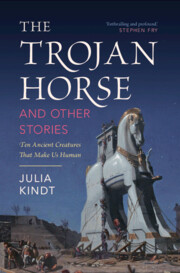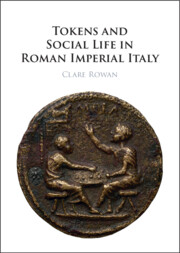Refine search
Actions for selected content:
24619 results in Ancient history
Part iv - Organising People
-
- Book:
- The Archaeology of Pharaonic Egypt
- Published online:
- 06 February 2024
- Print publication:
- 30 November 2023, pp 285-356
-
- Chapter
- Export citation
Conclusion: Divination and Philosophy in Paul
-
- Book:
- Divination and Philosophy in the Letters of Paul
- Published by:
- Edinburgh University Press
- Published online:
- 02 June 2023
- Print publication:
- 30 November 2023, pp 197-204
-
- Chapter
- Export citation
11 - Archaeology beyond Elites
- from Part iv - Organising People
-
- Book:
- The Archaeology of Pharaonic Egypt
- Published online:
- 06 February 2024
- Print publication:
- 30 November 2023, pp 317-352
-
- Chapter
- Export citation
Index
-
- Book:
- The Archaeology of Pharaonic Egypt
- Published online:
- 06 February 2024
- Print publication:
- 30 November 2023, pp 403-426
-
- Chapter
- Export citation
5 - Signs
-
- Book:
- Divination and Philosophy in the Letters of Paul
- Published by:
- Edinburgh University Press
- Published online:
- 02 June 2023
- Print publication:
- 30 November 2023, pp 163-196
-
- Chapter
- Export citation
Chronology of Egypt
-
- Book:
- The Archaeology of Pharaonic Egypt
- Published online:
- 06 February 2024
- Print publication:
- 30 November 2023, pp xi-xii
-
- Chapter
- Export citation
6 - Egypt in the Wider World
- from Part ii - Living Together
-
- Book:
- The Archaeology of Pharaonic Egypt
- Published online:
- 06 February 2024
- Print publication:
- 30 November 2023, pp 111-150
-
- Chapter
- Export citation
Copyright page
-
- Book:
- The Archaeology of Pharaonic Egypt
- Published online:
- 06 February 2024
- Print publication:
- 30 November 2023, pp iv-iv
-
- Chapter
- Export citation
2 - Historical Outline
- from Part i - Orientation
-
- Book:
- The Archaeology of Pharaonic Egypt
- Published online:
- 06 February 2024
- Print publication:
- 30 November 2023, pp 16-36
-
- Chapter
- Export citation
Copyright page
-
- Book:
- Risk in the Roman World
- Published online:
- 16 November 2023
- Print publication:
- 30 November 2023, pp vi-vi
-
- Chapter
- Export citation
Further Reading
-
- Book:
- Risk in the Roman World
- Published online:
- 16 November 2023
- Print publication:
- 30 November 2023, pp 130-133
-
- Chapter
- Export citation
4 - Life in Settlements
- from Part ii - Living Together
-
- Book:
- The Archaeology of Pharaonic Egypt
- Published online:
- 06 February 2024
- Print publication:
- 30 November 2023, pp 58-90
-
- Chapter
- Export citation
Frontmatter
-
- Book:
- Divination and Philosophy in the Letters of Paul
- Published by:
- Edinburgh University Press
- Published online:
- 02 June 2023
- Print publication:
- 30 November 2023, pp i-iv
-
- Chapter
- Export citation
Chapter 2 - A World Full of Risks
-
- Book:
- Risk in the Roman World
- Published online:
- 16 November 2023
- Print publication:
- 30 November 2023, pp 15-31
-
- Chapter
- Export citation

Risk in the Roman World
-
- Published online:
- 16 November 2023
- Print publication:
- 30 November 2023

The Trojan Horse and Other Stories
- Ten Ancient Creatures That Make Us Human
-
- Published online:
- 09 November 2023
- Print publication:
- 11 January 2024

Tokens and Social Life in Roman Imperial Italy
-
- Published online:
- 07 November 2023
- Print publication:
- 02 November 2023
-
- Book
-
- You have access
- Open access
- Export citation
Abbreviations
-
- Book:
- Tokens and Social Life in Roman Imperial Italy
- Published online:
- 07 November 2023
- Print publication:
- 02 November 2023, pp xviii-xx
-
- Chapter
-
- You have access
- Open access
- HTML
- Export citation
Preface
-
- Book:
- A Commentary on <I>Panegyrici Latini</I> II(12)
- Published online:
- 12 October 2023
- Print publication:
- 02 November 2023, pp vii-vii
-
- Chapter
- Export citation
General Index
-
- Book:
- A Commentary on <I>Panegyrici Latini</I> II(12)
- Published online:
- 12 October 2023
- Print publication:
- 02 November 2023, pp 518-526
-
- Chapter
- Export citation
